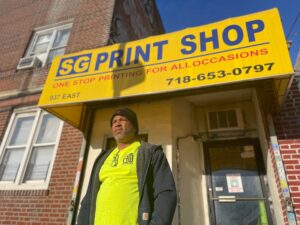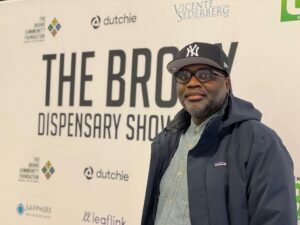Four applicants explain why they want to run a dispensary
New York’s first legal cannabis dispensary opened just as 2022 was drawing to a close, but hundreds more New Yorkers still wait for their opportunity to own a profit-making retail marijuana store.
The state’s Office of Cannabis Management issued the first 36 provisional licenses to qualifying businesses and nonprofits in early November. Over 900 people applied for the first round of licenses, according to the Office of Cannabis Management, but only 175 will be granted.
The first round of licenses will go to “justice involved” applicants – those who have either been convicted of a marijuana-related offense in New York, or who are closely connected to someone who has been convicted. That means that many former drug dealers will now ply their trade in the open.
Many of those who were punished under New York’s prior drug laws suffered lifelong consequences, according to Desmon Lewis, a co-founder of the Bronx Community Foundation.
“The harm of the war on drugs has transformed many people’s lives, including people in my family who were impacted by not being able to get jobs because of their cannabis record,” he said.
Charges and convictions “followed them in every aspect of their life,” making it harder to qualify for mortgages or start businesses, Lewis added.
But having a previous conviction isn’t enough to qualify for a license. The state also requires applicants to demonstrate their connections to New York State and their experience running a profitable business.
Four New York City residents who aspire to run their own dispensary told us their stories.
Alexander Hall, JDI Barbell and Hall Purpose

Alexander Hall qualifies for a dispensary license due to a relatively minor possession charge, but that’s not why he spent over a decade in prison. Hall and some friends left an altercation at a nightclub in 2005, at which someone was hit with a broken bottle. Hall later came back with a gun and shot three people, killing one.
The jury dropped the murder charge but convicted him of manslaughter.
For Hall, the next 13 years was a time of reflection. He went to college through the Bard Prison Initiative, wrote a 100-page senior thesis, and even joined the prison debate team. He was one of the debaters who beat a West Point team, and was in the audience when his classmates crushed Harvard.
That was a “legitimizing” experience for the inmates, who until then had no way to measure themselves against the outside world. “You imagine yourself being important and being smart,” Hall said, “but you constantly second guess yourself because you don’t have anything to compare it to.”
After leaving prison, Hall got a job as a strength coach, and eventually partnered with his gym’s owner. He now co-owns two JDI Barbell gyms in the city. He started another company, Hall Purpose, that works with incarcerated adolescents in Brooklyn and the Bronx.
If he gets the dispensary license, Hall said it will be another chance to legitimize the skills and talent of people leaving prison.
“I want to be able to give people coming home opportunities,” he said. “I want to be able to change the way that people view formerly incarcerated people.”
But legalizing cannabis may not reverse all of the harm caused by the war on drugs, he said, especially to communities of color.
“For the people who’ve done decades in prison,” Hall said, “it just seems much more outrageous and egregious now that we’re saying, ’you know what, this stuff is actually okay after all.’”
“It’s definitely not sufficient,” he added. “But I think it’s an effort at some form of conversation.”
Howell “Howie” Miller, H. Miller Construction and Two Buds Enterprises

After years of selling pot illicitly and three stints in prison – two of them related to cannabis – Howell “Howie” Miller now wants to sell marijuana legally with his older brother, Christopher.
Miller said he got his start in the drug business when he was 10, helping his stepfather bag weed. At 13, he started selling for two dealers on Carpenter Avenue.
His first incarceration was at age 22, for a cocaine and firearms offense. When he was released from prison a decade later, he decided to get into the construction business.
“I decided to change my life a little bit,” he explained. He joined the carpenter’s union as an apprentice, and started doing interior work for people’s homes. But when he tried to start his own business, he couldn’t raise enough capital to get it off the ground.
“I went to my family and friends trying to get a conventional loan. I was denied because I have no history of credit, no real estate stuff. I really didn’t have much,” Miller recalled. “So that’s when I made the conscious decision, ‘Hey, I’m gonna sell marijuana.’”
Miller began shipping marijuana from the Arizona-Mexico border, hiding the weed in moving trucks and 18-wheelers with secret compartments. He says that the proceeds went into his business, Mill and Mill Construction, which eventually grew to 23 employees.
“The problem was I got greedy,” Miller admitted.
He was caught twice. The first time, in 2005, he was caught with ten pounds of marijuana and spent 18 months in prison.
By the time the Drug Enforcement Administration cracked his operation in 2012, Miller had smuggled at least 11 tons of marijuana. He was sentenced to 12 years in prison. While he was behind bars, his construction company collapsed.
After his release in January 2022, Miller started a new construction company and applied for one of the new dispensary licenses. The Bronx Defenders helped him file the paperwork.
Miller believes he is a particularly strong candidate for a dispensary license, thanks to his prior experience. “I did it illegally on a high level and legally on a high level,” he said, referring to his old businesses.
Miller and his brother Christopher already have a name picked out for their business—Two Buds Enterprises—and they hope to run it in the northern Bronx where they grew up. Their slogan is “Let’s do it Legit.”
”Because obviously every time I do it illegal, I go to f…ing jail,” Miller said with a laugh.
While it will take some time to get the dispensary started—Miller is planning to do the construction work himself—he is broadly enthusiastic about his prospects as a future canna-businessman.
“Everybody is hopeful,” he said. “Good vibes, fingers crossed, everybody hopes I get it.”
Coss Marte, Founder of ConBody and ConBud

Coss Marte was 13 when he was first arrested for possession, and he was in and out of the system for the remainder of his teenage years. “I just grew up in it,” he said, explaining that the Lower East Side “was a very heavily drug-infested neighborhood.”
By his ninth arrest at 23, Marte was running a multi-million dollar distribution network with over 20 deliverers. At its height, he estimates that he was shipping five pounds of marijuana every week, as well as a kilogram of cocaine.
During his four-year incarceration, a prison doctor warned Marte about his high cholesterol levels. That started him on a workout program that ultimately became the basis of his current fitness company.
“I lost over 70 pounds in six months, and then I started a workout program in the yard where I was getting other inmates to work out with me,” Marte said. “ And we started doing classes out in the yard.”
After prison, Marte brought his workout techniques to the streets and parks of New York. ConBody, the gym he now runs in Manhattan, teaches the same routine he used in prison. To drive the point home, the studio is designed to look like a jail cell, complete with bars. “Do the time,” commands a poster by the entrance.
There are no weights or machines at ConBody, just energetic trainers who were also formerly incarcerated. “We’re training the inmates in there to become trainers and creating a pipeline from the inside out,” Marte explained. So far they have hired over 50 former inmates, and none have returned to prison. If he gets a dispensary, he hopes to staff it with former inmates as well.
For Marte, legalization means that the government is recognizing the effects of long-term drug prohibition, even if it does not repair the long-term damage to minority communities.
“I’m glad that they even took the initiative to even acknowledge that,” he said. “We can’t pay off everything that’s been done, or the generational trauma that’s been done.”
Marte has already lined up two locations for possible dispensaries: one on the Lower East Side, and another in the South Bronx. Although he hasn’t yet received a license, he has already started talking to suppliers and training some of his employees in the business.
Donnell Furlow

Donnell Furlow was relatively fortunate, at least compared to some other applicants. He was a foreign youth ambassador at the Edward Reynolds West Side High School on 102nd Street and went to live on an Israeli kibbutz when he was 18.
Furlow described a shoestring upbringing in Spanish Harlem with a single mother providing for five sons. Like many of his friends, he started selling marijuana to make ends meet, but he refused to sell harder drugs.
“I didn’t want to sell death,” he said. “So I got into the legacy business.”
That didn’t keep him out of trouble. Furlow was arrested five times: three times for marijuana, and twice for disorderly conduct during police stops. After the third drug arrest, he served two months in jail and performed ten days of community service.
Furlow was one of hundreds of visitors at a model dispensary showroom set up temporarily at the historic Bronx Post Office to demonstrate what a potential pot shop could look like. As prospective retailers tried out the software and equipment for legal cannabis sales, Furlow described the weed business before legalization.
“Back in those times we had stop and frisk,” Furlow explained. “You couldn’t walk around without an officer approaching you. Just going about your business and you’re getting stopped.”
Furlow worked for about 12 years as a stagehand and projectionist at the Hudson Theater in Manhattan, before purchasing a route to work as a distributor and sales representative for Utz. After selling the salty potato chip snacks for five years, he recently sold the route. Because he was an independent contractor, that route qualified him for the business requirements of the dispensary application.
“I was like, ‘Let me just apply, see what happens,’” he said later. The Bronx Defenders covered his $2,000 application fee, but he hasn’t yet approached any potential investors or business partners.
But even if he gets the license, Furlow said, the legalization of cannabis does not signify that the state is ready to right past wrongs. To the contrary, he said, New York is simply trying to cash in.
“It doesn’t make up for anything,” he said. “The state realized how much money is involved, and now you get certain prestigious and political people who are actually indulging in it, so they can no longer stigmatize it.”

